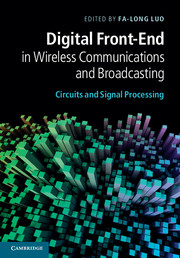Book contents
- Frontmatter
- Contents
- Contributors
- Preface
- Part I Introduction to digital front-end
- Part II DPD and CFR
- Part III DUC, DDC, ADC, DAC, and NCO
- Part IV Digital calibration, imbalance compensation, and error corrections
- 16 Digital compensation and calibration of I/Q gain and phase imbalances
- 17 Joint digital predistortion of I/Q modulator and power amplifier impairments
- 18 Diversity and error compensation in OFDM transceivers
- 19 Front-end architectures and impairment corrections in multimode and multi-antenna systems
- Part V Circuits and system integration in digital front-end
- Index
- References
19 - Front-end architectures and impairment corrections in multimode and multi-antenna systems
from Part IV - Digital calibration, imbalance compensation, and error corrections
Published online by Cambridge University Press: 07 October 2011
- Frontmatter
- Contents
- Contributors
- Preface
- Part I Introduction to digital front-end
- Part II DPD and CFR
- Part III DUC, DDC, ADC, DAC, and NCO
- Part IV Digital calibration, imbalance compensation, and error corrections
- 16 Digital compensation and calibration of I/Q gain and phase imbalances
- 17 Joint digital predistortion of I/Q modulator and power amplifier impairments
- 18 Diversity and error compensation in OFDM transceivers
- 19 Front-end architectures and impairment corrections in multimode and multi-antenna systems
- Part V Circuits and system integration in digital front-end
- Index
- References
Summary
Introduction
Nowadays the market continues to show a real interest in the development of telecommunication networks based on radiofrequency (RF) systems. Particularly, we can note a proliferation of radiofrequency standards such as WiFi, WiMax, DVB-T, or the 3G or 4G standards and a strong desire to merge those standards in a single terminal. Along with the existing standards, all new standards allow the operators to offer new and better services in terms of speed, quality, and availability. Consequently, in order to handle this important diversity of telecommunication techniques, there is a growing interest in developing new front-end architectures capable of processing several standards.
Of course, one first point is to enhance the digital resources of the terminal to offer Software Defined Radio (SDR) potential so that the structure can be easily reconfigured and evolved. But along with this evolution towards high numerical capacities, terminals are also required to propose an RF part enabling multi-standard, multi-frequency and often multi-antenna operations (referred to as multi-* terminals).
Information
- Type
- Chapter
- Information
- Digital Front-End in Wireless Communications and BroadcastingCircuits and Signal Processing, pp. 573 - 600Publisher: Cambridge University PressPrint publication year: 2011
